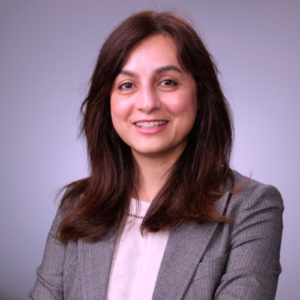In recent years, physician burnout has emerged as a critical issue impacting the health care system worldwide. Defined by high levels of emotional exhaustion, depersonalization, and a reduced sense of personal accomplishment, understanding burnout among medical professionals has become important to maintaining health care systems, as they continue to be stretched to their limits. To achieve this, Advancing Health Scientist Dr. Nadia Khan surveyed physicians across several different specialties at two hospitals in Vancouver.
“We were interested in understanding physician burnout across several areas to determine how widespread it is within the hospital environment,” said Dr. Khan, Head of the Division of General Internal Medicine within the Faculty of Medicine at UBC. “Different interventions would be required depending on if the burnout was specialty-specific or happening at a more systemic level.”
The study’s objectives were to assess burnout rates, work–life conflict, and intentions to quit, as well as to compare physicians who worked on the COVID-19 frontlines with those who did not. The survey was sent out during the pandemic to physicians in all hospital departments.
Burnout prevalent across specialties

Burnout was alarmingly high, with 69 per cent of responding physicians sharing that they were experiencing burnout symptoms. The study found that burnout rates were comparable across various specialties, with burnout slightly more prevalent in surgical specialties compared with non-surgical ones. This finding suggests that high burnout rates were universal, affecting all hospital physicians similarly.
Emotional exhaustion was a core element of burnout affecting most participants, particularly among those in surgical fields. Physicians also reported high levels of depersonalization, indicating a growing emotional distance from their patients.
“Not only can this have a detrimental impact on patient-centered care, but it is challenging to address from a health care systems perspective,” said Dr. Khan.
Although the survey found that burnout was comparable across several specialties, there was another factor which showed significant difference between surgical and non-surgical respondents: work–life conflicts. Nearly 67 per cent of surgical respondents reported insufficient time for personal or family life, compared with 36 per cent of non-surgical specialties, even after adjusting for variables like work hours, weekend duties, and call shifts. This is likely due to a combination of factors, including a heavy workload, frequent overtime work, and inflexible work hours.
Another question that the survey asked was centered on whether or not respondents were considering quitting. Roughly 25 per cent of all respondents reported that they were planning to leave their positions and there were no significant differences in quitting intentions based on specialty or COVID-19 frontline duties. This highlights a widespread sense of burnout and dissatisfaction across the health care workforce.
“This finding is particularly concerning,” said Dr. Khan, “High turnover rates among physicians could worsen health care shortages and negatively impact patient care in the long run.”
Impact on patient care
Physician burnout has far-reaching implications for health care quality and patient outcomes. Burnout symptoms, especially emotional exhaustion and depersonalization, may impair a physician’s clinical judgment, reduce empathy, and increase the likelihood of medical errors.
When physicians are emotionally drained and disengaged, their ability to provide compassionate, attentive care can suffer, which can contribute to poorer patient outcomes. Moreover, high levels of work–life conflict and quitting intentions may lead to workforce instability. Surgical specialties, which are already susceptible to burnout, could experience reduced staff retention, thereby increasing wait times for surgeries and creating additional stress for remaining staff members.
This research, conducted with the support of several Advancing Health researchers, including Drs. Amy Salmon, Anita Palepu, and Peter Dodek, highlights the importance of addressing physician burnout at a health system level. The universal nature of burnout across specialties underscores that this issue is systemic rather than confined to specific fields. Addressing this challenge will require comprehensive approaches, including work–life balance initiatives, mental health support, and better staffing models, to help mitigate the effects of burnout and protect the well-being of physicians.
“Without meaningful interventions, the high rates of burnout and intention to quit could lead to more physicians leaving the field, putting further strain on the health care system,” said Dr. Khan. “By addressing physician burnout at a systemic level, health care can create a more effective and well environment for both physicians and patients.”



